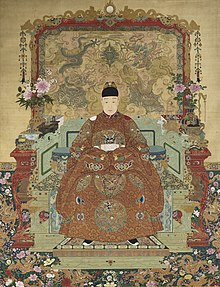Tianqi
Tianqi天啓 (* December 23, 1605 ; † September 30, 1627 ), maiden name: Zhu Youjiao朱 由 校, temple name : Xizong熹宗, was the fifteenth Chinese emperor of the Ming Dynasty . He was the eldest son of Emperor Taichang and concubine Xiaohe . Tianqi ruled China from 1620 to 1627 .
Life
The Tianqi emperor ascended the throne at the age of fourteen and inherited from his father Taichang and his grandfather Wanli , mainly because of the latter's poor governance, an empire with ruined state finances and a paralyzed bureaucracy. China needed urgent reforms, but Tianqi was the worst possible occupation for the office of Son of Heaven . He was completely uneducated and showed no interest in politics or the needs of the people. Presumably he had a learning disability .
Most of all he trusted the eunuch Wei Zhongxian , the former servant of his wet nurse, Lady Ke . The eunuch Wei had gained great influence during Wanli's tenure, practically exercising power in the state and establishing a regime of terror within the palace from 1624 to 1627. Wei appointed his confidante ministers and enriched himself unscathed from the dwindling state revenue. From 1625 he had the members of the reform-friendly Dongling Society killed with the help of his secret police. The Lady Ke secured her influence on the emperor and the affairs of state by removing all other ladies-in-waiting from the Tianqi harem , imprisoning them and finally starving them.
Emperor Tianqi lived in seclusion and did not care about the problems in his immediate vicinity or the disasters outside the capital Beijing . Instead, he preferred to deal with woodworking, which earned him the nickname “Imperial carpenter” among the people. Eventually, Tianqi even ordered Wei to be worshiped just like Confucius . He probably also had no objection to kneeling down in front of the statue of Weis even with the spring and autumn sacrifices and touching the ground three times with his forehead.
Under Tianqi, the Ming's reputation was massively damaged, both domestically and externally, by the emperor's continued inaction: the economy stagnated and the bureaucracy was largely incapable of action, which led to long-lasting peasant uprisings around 1627. From 1621 to 1629 there were indigenous uprisings in the outskirts of Sichuan , Guizhous and Yunnans provinces under the command of She Chongming . In 1622, the White Lotus secret society was established in Shandong Province . In terms of foreign policy, the empire was under pressure from the Manchu under Nurhaci and, after his death on September 30, 1626, under his eighth son Huang Taiji . These two rulers had already conquered large parts of Manchuria, captured Shenyang (Mukden) and Liaoyang in 1621 , and the undersupplied Ming troops failed to defeat their armies (except in the Battle of Ningyuan ). In 1627 the Manchu attacked China's most important vassal state, Korea , which they were to conquer entirely in 1638. All of this aroused deep dissatisfaction among many subjects and led to the belief that the Ming were no longer able to rule China and that they had lost the mandate of Heaven .
Emperor Tianqi died in 1627 at the age of less than 22. Wei Zhongxian and Lady Ke were ousted, and Wei was driven to commit suicide. Because the emperor's sons had died while their father was still alive, palace intrigues tried posthumously to impose an heir on him . His younger brother Zhu Youjian emerged victorious and ascended the dragon throne under the motto Chongzhen .
literature
- Jacques Gernet : The Chinese World . Frankfurt 1997, ISBN 3-518-38005-2 .
- Gisela Gottschalk : China's great emperor . Herrsching 1985, ISBN 3-88199-229-4 .
- Frederick W. Mote: Imperial China 900–1800. Harvard, Cambridge 2003, ISBN 0-674-44515-5 .
- Ann Paludan: Chronicle of the Chinese Emperors. Thames & Hudson, London 1998, ISBN 0-500-05090-2
- Denis Twitchett , Frederick W. Mote: The Cambridge History of China. Vol. 7. The Ming Dynasty 1368-1644. Part 1. University Press, Cambridge 1988, ISBN 0-521-24332-7 .
| predecessor | Office | successor |
|---|---|---|
| Taichang |
Emperor of China 1620 - 1627 |
Chongzhen |
| personal data | |
|---|---|
| SURNAME | Tianqi |
| ALTERNATIVE NAMES | Zhu Youjiao (maiden name); 朱 由 校 (maiden name); Xizong (temple name); 熹宗 (temple name) |
| BRIEF DESCRIPTION | Chinese emperor of the Ming Dynasty |
| DATE OF BIRTH | December 23, 1605 |
| DATE OF DEATH | September 30, 1627 |

